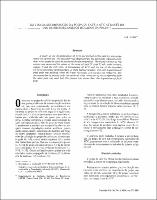Estudo da decomposicao da polpa do café a 45 grados centígrados através do uso de microorganismos isolados da polpa
| dc.contributor.author | Tauk, S.M | |
| dc.date.accessioned | 2022-03-22T15:33:05Z | |
| dc.date.available | 2022-03-22T15:33:05Z | |
| dc.date.issued | 1986-07 | |
| dc.identifier.uri | https://repositorio.catie.ac.cr/handle/11554/11690 | |
| dc.description.abstract | A study of the decomposition of fresh and pressed coffee pulp by microorganisms was carried out. The inoculum was obtained from the same pulp. Optimal conditions were sought in order to accelerate the decomposition. The transformation of this residue was monitored by means of the assay of total N, total P, ash, water content, organic C and C/N ratio. A temperature of 45ðC and the use of the inoculum served to accelerate decomposition of fresh pressed residues. The best degradation of fresh pulp was achieved when the yeast Hansenula polymorpha was employed. The decomposition of pressed pulp was achieved when a mixture of microorganisms from the same pulp was used, but this process was slower than the degradation of fresh pulp. | es_ES |
| dc.format.extent | 10 páginas | es_ES |
| dc.language.iso | pt | es_ES |
| dc.relation.ispartof | Turrialba; Vol. 36, no. 3 | es_ES |
| dc.subject | COFFEA ARABICA | es_ES |
| dc.subject | DETERIORO | es_ES |
| dc.subject | MICROORGANISMOS | es_ES |
| dc.subject | LEVADURA | es_ES |
| dc.subject | DEGRADACIÓN | es_ES |
| dc.subject | PULPA DE CAFÉ | es_ES |
| dc.subject | NITRÓGENO | es_ES |
| dc.subject | FÓSFORO | es_ES |
| dc.subject | GUATEMALA | es_ES |
| dc.subject | AMÉRICA CENTRAL | es_ES |
| dc.subject.other | Sede Central | es_ES |
| dc.title | Estudo da decomposicao da polpa do café a 45 grados centígrados através do uso de microorganismos isolados da polpa | es_ES |
| dc.type | Artículo | es_ES |
| dc.identifier.status | openAccess | es_ES |
Files in this item
This item appears in the following Collection(s)
-
Turrialba [2688]


